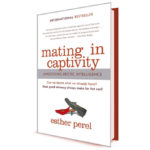
Daniel Bergner is one of our favorite writers on the topic of sex. A few years back he wrote the awesome book The Other Side of Desire, which we raved about at the time, and then shortly after he wrote a cover story about female desire for the New York Times magazine, which we also raved about. That article became his new book: What Do Women Want? Adventures in the Science of Female Desire. We chatted with Daniel about monogamy, erotic distance, ev0-psych crazies, and the lust-killing properties of the flaccid penis…
EM & LO: Why do we still know so little about female desire, why is it not studied more?
DANIEL BERGNER: We–our society and our scientists–have spent so long seeing what we wanted to see: female desire as a lesser drive, weak in comparison with male lust. This has been soothing to society and comforting to men. Only lately, as more and more female scientists have begun doing sex research, have we begun to see beyond the distortions.
One of the major findings presented in your book is that women are not naturally monogamous, that sex with strangers is a big turn-on for women, and they crave sexual variety and novelty, just like men. How have people reacted to this news? Have you been surprised by any reactions?
DB: For men, this triggers a bit of trepidation. It’s like something we always knew yet managed not to know, or at least not to think about too much. I laugh about it, a bit nervously, with my girlfriend all the time.
Would you say that women are naturally even less monogamous than men?
DB: This is a complex question. Start with the likelihood that, innately, women’s sexuality is just as promiscuous as men’s. Add onto that the cultural constraints that are still placed upon women’s desire, even in our seemingly unrestrained society, and the effect this has on the brain. The result may well be that, when it comes to sex, monogamy is even more of a problem for women than for men. A quick lesson in the neurology of lust is needed to understand why. I hope that the book lays this out in an interesting way.
We’re big fans of Esther Perel’s writing, and her notion that desire requires erotic distance in a couple. We’re guessing you’d say that this is equally true for women and men — that more intimacy and closeness can kill desire for women just as it does for men?
DB: Yes. In fact, I’d say that often our quests for unconditional love and for a “you complete me” level of closeness–longings that are entirely human–lead us farther and farther from eros, farther and farther from the passion we seek.
We love a good evo-psych take-down! Tell us how you think they compare to the Christian right…
DB: It’s funny. I didn’t set out to attack evolutionary psychology. But when I went back to read the academic papers that put forth the evo-psych idea that men are genetically programmed to be promiscuous while women, relatively speaking, are innately designed to seek out one good man, I found pages of circular logic and flimsy evidence. And then, though I’m sure not many evolutionary psychologists identify as evangelical Christians, the two groups have almost identical notions about the natural sexual modesty of girls and women. (I read a lot more evangelical health education material than I ever expected to.) Tellingly, the two groups are equally confident about this notion; they tend toward absolute certainty, which is usually a tip-off that something’s amiss.
We’ve been saying for years that women are visual creatures, just like men. So it seems that scientific studies have found this to be true?
DB: You’ve got it right. And here again, it was so nice for we men to believe otherwise.
We were so happy to see you talk about clitoral anatomy, how it’s a network, not a magic button, and easily as big as the penis! How does this knowledge change what we know about female desire and how we should approach female desire?
DB: Maybe more than anything it reminds us about how fallible we are, how we can blind ourselves to anything. It wasn’t till about a decade ago that anatomists focused on the sprawl of the clitoris. Till then, it was a tiny button, dwarfed by the phallus. Hundreds and hundreds of years of dissections and we failed to get it right. It’s funny. But I need to get serious here, maybe overly serious. I spend a lot of time in Africa (in another part of my writing life), in countries where clitoridectomy is common. We in the West are a long way from that brutal practice. Yet here, until recently, was this metaphoric equivalent. Science managed to cut the clitoris down to demure size.
So, the flaccid penis has lust-killing properties?! Do tell…
DB: Meredith Chivers, one of the scientists at the center of my book, has shown that women get physically aroused by all sorts of erotic images, but one exception is a man, no matter how good-looking, in a state of slackness. He’s just not announcing desire.
We’ve written a lot on our site about women’s rape and ravishment fantasies. What role does narcissism play in this sort of fantasy?
DB: The desire to be desired, to be desired uncontrollably, came up with researchers and came up frequently during my interviews with everyday women. (Which may explain why the aforementioned slackness can spell trouble.) Follow this logic of women’s lust, and you’re in the realm of rape fantasies. None of this is to back even an inch away from No Means No. Fantasy is deeply revealing psychologically, it’s a crucial window into the psyche, yet there is a long distance between what we fantasize about and what we want to have happen.
You claim that the goal of a “female Viagra” is to find a medicine that will help women cope with monogamy. Is this some sort of conspiracy to keep women playing the evo-psych role they’re expected to play? Or is it something that women want and are asking for, to be able to desire their husbands year after year? Or a combination of the two?
DB: A great question. Women are certainly asking for the drug. I’d put the answer like this–while the drug will be revolutionary in some scientific ways, in social ways it is deeply conservative. I’ve had several conversations, since the book has been out, with people in the pharmaceutical industry. No one has objected to my argument that the main market for the drug will be women in long-term monogamous relationships. It will help women to play their role more perfectly.
What Do Women Want? Adventures in the Science of Female Desire by Daniel Bergner is on sale now
















